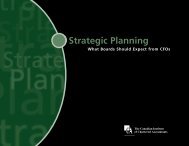Making such business arena choices is generally regarded as one <strong>of</strong> themost demanding activities in the process <strong>of</strong> formulating or evaluatingan organization’s strategy. It involves the most amount <strong>of</strong> informationgathering and typically represents the bulk <strong>of</strong> the organization’sstrategic planning efforts.Accordingly, in making their assessment <strong>of</strong> the market potential andinternal capabilities associated with various business arenas, directorsneed to have in place a strategic planning process, which ensuresthat the following questions are adequately addressed for eachbusiness arena:• What is the nature and extent <strong>of</strong> demand for the products andservices <strong>of</strong>fered?• What is the potential for pr<strong>of</strong>it?• To what extent (and in what way) are customer needs currentlybeing met by existing competitors?• To what extent are the organization’s products and servicessignificantly differentiated from - and <strong>of</strong>fer a clear advantage over- existing competitors?• Does the organization have the resources, skills and capabilitiesrequired to pursue the growth and pr<strong>of</strong>it potential in thebusiness arenas that it has targeted?• If lacking a competitive advantage or any specific resources, skillsor capabilities, how does the organization intend to acquire them– if at all?• What are the major ‘assumptions’ underlying the choice <strong>of</strong> eachmajor business arena?• What are the methods <strong>of</strong> entry to or exit from the major businessarenas selected (i.e. merger, acquisition, divestment, closure, sale,etc.)• What alternative business ‘postures’ (i.e., grow/invest, hold,harvest, divest, no entry) were considered and rejected for eachbusiness arena (both existing and new).“ Without competitors therewould be no need for strategy,for the sole purpose <strong>of</strong> strategicplanning is to enable thecompany to gain, as effectivelyas possible, a sustainableedge over its competitors. ”Kenichi Ohmae<strong>Strategy</strong> Implementation Considerations17. Have the proper organizational arrangements beenselected, designed and ‘aligned’ to reflect, reinforce andsupport the strategy?Given sufficient time, information and human intelligence, anyorganization is capable <strong>of</strong> designing outstanding strategies.Thetough part occurs, though, when it comes to execution i.e. turning thestrategy into a reality.One <strong>of</strong> the major ways in which execution happens is through theorganization’s operating plan. But, directors are generally discouragedfrom becoming involved in this area and for good reason (See thediscussion related to Question 9).The other major method by which an organization executes its strategyis when it aligns its staff, structures, reward and control systems to8
focus on, support and reinforce the organization’s strategic goals andobjectives.This is called ‘strategic organizational alignment’ and itentails, at least, four major considerations with which directors need tobe concerned.The first involves translating the mission, vision, values and objectivesinto terms that are meaningful and understood by ALL organizationalmembers so that they can, in turn, put forward a united and concertedeffort towards the strategy’s realization. Often, this requires thatemployees’ jobs must be redefined or re-specified to take into accountthe requirements <strong>of</strong> the strategy.The second important element <strong>of</strong> ‘alignment’ requires that individualsbe either hired on the basis <strong>of</strong> their ability to perform the critical tasksand priorities specified in the strategy – or be trained to do so.A thirdelement stipulates that information systems be adjusted to regularlymeasure and report on an organization’s progress against all aspects <strong>of</strong>its strategy as well as the contributions <strong>of</strong> individual members towardsits achievement. In so doing, the effectiveness <strong>of</strong> both operating plansand specific job behaviors can be assessed and modified in order tobetter achieve the strategy - and before it’s too late. Finally, the fourthelement <strong>of</strong> organizational alignment stresses that reward systems beadjusted so that employees feel inspired and motivated to put evengreater effort into making the strategy happen.When these organizational alignment modifications have been made,the probability <strong>of</strong> an organization achieving its strategic goals andobjectives will be greatly enhanced.Assessing Strategic Risks18. Have all the significant internal and external strategic risksbeen identified, quantified and addressed in the plan?In the course <strong>of</strong> developing a strategic plan, there is always uncertaintyaround its ultimate attainment.And with uncertainty comes risk i.e.,possible events (with varying degrees <strong>of</strong> probability attached), which ifrealized, will have an adverse effect on the organization and interferewith its ability to either achieve its business opportunities or overcomeorganizational weaknesses.The presence <strong>of</strong> risks can also significantlyalter which opportunities to pursue, get in the way <strong>of</strong> certainorganizational arrangements and make the accomplishment <strong>of</strong>objectives related to the mission, vision and values extremely difficult.Consequently, it is necessary for directors to understand those risksassociated with a particular strategy, their probability or likelihood <strong>of</strong>occurrence and their potential impact on the organization.While there are many different types <strong>of</strong> risk that an organization mightpossibly face, the main strategic risk areas <strong>of</strong> concern to the Boardparallel those which drive its strategy, namely, the risk that:• stated objectives will not be realized;• the market potential perceived to exist will not materialize (e.g.due to changes in: customers’ demand/satisfaction, commodityprices, competitive intensity, regulations, government etc.);• internal resources necessary for strategic success either disappearor cannot reasonably be secured (e.g., the loss <strong>of</strong> key employees,a decline in company morale, the inability to secure apatent/technology or to innovate, failed marketing/salesinitiatives, fraud and asset theft, etc.); and• organizational arrangements chosen to implement the strategywill not function as intended (e.g. the benefits <strong>of</strong> moving to morecentralization/decentralization do not materialize).9
















